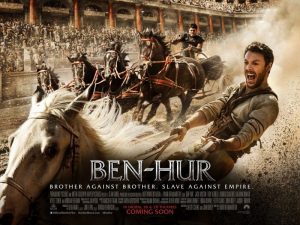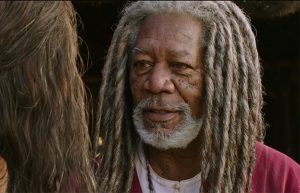
Timur Bekmambetov’s “Ben-Hur” is a remake of a remake (2003) of a remake (1959) of a remake (1925) of an unauthorized remake (1907) of a stage adaption (1899) of a novel (1880). Credit goes to an anonymous friend for doing that dirty work. I present this information to prove that a film being a remake doesn’t automatically make it terrible. Just look at the “Pete’s Dragon” remake, which in my opinion is far superior to the original. Better yet, look at the 1959 version of “Ben-Hur,” a certifiable classic that many refer to as the original film despite it being a remake. The same goes for John Carpenter’s “The Thing,” which many don’t realize is a remake of the 1951 sci-fi thriller “The Thing From Another World.” The point I’m trying to make is that originality as we know it has been dead for nearly a century. What matters most is quality, not originality.
With that being said, the latest version of “Ben-Hur” feels pointless. Pointless because it doesn’t aspire to be unique. The 1959 remake was made to capitalize on new technology, which many believed to be the case for this version. And while there is some usage of new technology, a lot of the sets and props are recycled from the 1959 version. This begs the question why redo a beloved classic? By reusing sets and the like, I am reminded heavily of the 1959 version, making me wish I were watching that instead.

The only experimentation on hand is in the attempt to condense the near four-hour epic into two hours. This is a failed experiment, resulting in the entire production feeling rushed. There’s no time to let the drama breathe, with each classic sequence feeling like clockwork this time around. The familial drama comes off as rudimentary; the commentary on war on peace too heavy-handed. The crucifixion of Jesus Christ (Rodrigo Santoro) feels shoehorned in as opposed to integral. These exist to drive a story, not an emotion.
The story is as told before. The pacifist Judah Ben-Hur (Jack Huston) is thrust into war with his adoptive brother Messala Severus (Toby Kebbell), a Roman soldier who falsely accuses his brother of treason. Ben-Hur is sentenced to a life of galley slavery, only to be saved by Sheik Ilderim (a sleepwalking Morgan Freeman, sporting a ridiculously goofy wig). He is prepped for a chariot race against his brother in an effort to bring hope in the face of tyranny. Pontius Pilate (Pilou Asbæk) is a mere afterthought.

Not much time is devoted to the family warfare. This is probably for the better, as Timur directs these scenes as if it were a soap opera. Characters speak in cheesy exposition, with betrayals and heartbreak just waiting for a dramatic pause. The dialogue in Keith R. Clarke & John Ridley’s screenplay doesn’t get much better throughout, but is at least grounded by the trials and tribulations. Hokey dialogue still reigns supreme, but it takes a backseat to the spectacle.
Said spectacle looks good on the surface, but is hindered by shaky camera work. We’re all familiar with this camerawork by now: the act of shaking the camera wildly in an effort to make the viewer feel part of the action. It almost never works, too dizzying and distracting to leave an impact other than nausea. It’s criminal to use it here, hiding the gigantic sets and undercutting the intensity. Both the ship battle from the galley’s perspective and the chariot race are staged well, but undermined by the hectic camera cutting.

The landscape is lavish, yet one rarely ever notices. Quick cuts and stiff camera angles hide the sets in the background. The characters are shot in a way in which they tower over the sets as opposed to the other way around. This results in the scale coming off as small as opposed to grand, even in the chariot race. Why go to such lengths to create an opulent world only to conceal it?
It’s possible that a longer runtime would’ve helped in making this adaptation of “Ben-Hur” work, but I doubt it. The entire production needs an overhaul. The editing and camera work comes first (as they go hand-in-hand), fixing the chaotic mess that resulted into a smooth transition that allows the audience to feel, not be assaulted. Next would be in the direction of the drama, treating it seriously and not like a soap opera. Lastly, a rewrite that excises cheesy dialogue in favor of well thought-out commentary on religion and war. Maybe next time.
Final Rating: D
